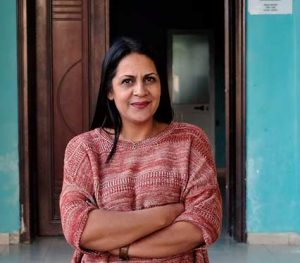I am Generation Equality: Child Marriage Survivor & Activist
 27 November 2019
27 November 2019

Fatmira Dajlani leads the “Roma Gateway for Integration” organization in Fushe Kruje, Albania . Credit: UN Women/Parllaku
By Fatima Dajlani
FUSHE KRUJE, Albania, Nov 26 2019 (IPS)
— I am Generation Equality because…
I didn’t want other girls to go through the same struggles I experienced. I got married when I was 14 years old. I had no idea what marriage was.
Three things you can do to stop child marriage:
Promote girls’ education and inform young girls and their community about the consequences of child marriage.
 Facilitate exchange experiences among girls from non-Roma communities and those from Roma communities
Facilitate exchange experiences among girls from non-Roma communities and those from Roma communities
Join #GenerationEquality campaign by sharing stories like these with your friends and social media networks.
There was no wedding, no such thing as the white dress. It was just a room where I had to prove my virginity. I remember the first day of my marriage with a lot of pain. It happened 24 years ago, but I remember this to be the ugliest thing in my life. I was just a child, I thought that if I didn’t obey, I would humiliate my family and hurt their pride.
I started working in the Roma community because I wanted to change their mentality, about child marriage. I didn’t want other girls to go through the same struggles I experienced. [My own experience] has driven me to work with young girls, to motivate them to be independent.
I talk about this every day in the Roma community. I explain to girls what marriage is, what it entails, and what they will sign up for if they get married at an early age. I tell the girls that they should not get married if they don’t want to, even if their parents insist.
I am ready to protect each one of them if they don’t want to get married. There have been many cases in which girls have refused, and their parents have finally given up.
Education is the key
It is very urgent to work with and raise awareness among girls and their mothers to fight child marriage. If the mother doesn’t want to give her daughter for marriage, she will not be married off early.
But it is almost impossible to fight the mentality about child marriage among parents. They justify it as being part of our culture and traditions, but that is not true.
We should educate Roma girls, give them the chance to be independent. In the Roma community in Fushe Kruje, (a town 30 km from the capital of Albania) girls aren’t allowed to go to school after the sixth grade, because they are considered matured at this stage. There are around 300 Roma families in this community and only two girls have made it to high school and university.
Recently, a 12-year-old girl got married and broke up only two weeks after.
Joining forces to end child marriage
Today, Roma girls are more informed about child marriage and they have understood that they can say no to marriage and oppose their parents. But the parents are worried that if their daughters are not married before 18, no one will marry them.
While among boys, it is different.
They don’t get married before 18 anymore. It is important to work with them as well. We talk to boys about many social issues that the community faces, such as domestic abuse, the use of alcohol and gambling.
Fighting child marriage should be a joint effort. The more activists and institutions join the cause, the greater the change. We all have a lot of work ahead of us.
*This was originally published on Medium.com/@UN_Women
The post I am Generation Equality: Child Marriage Survivor & Activist appeared first on Inter Press Service.
Excerpt:
*Fatmira Dajlani has been working as an activist for 14 years in Albania and is leading “Roma Gateway for Integration” organization in Fushe Kruje.
Billions of people across the world stand on the right side of history every day. They speak up, take a stand, mobilize, and take big and small actions to advance women’s rights. This is Generation Equality.
The post I am Generation Equality: Child Marriage Survivor & Activist appeared first on Inter Press Service.
